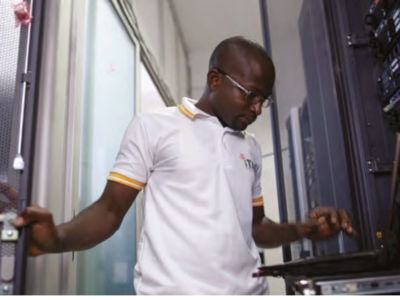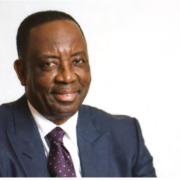LEADING THE SERVICE SECTOR BOOM.
The Information Communication Technology sector is one of the most vibrant in the economy. Since reforms to the sector in the 1990s that allowed more private sector participation, it has become host to a lot of investment and innovation.
The Covid-19 pandemic, which reduced in-person interactions, gave a huge boost to the sector, as it led to increased use of digital tools for professional, commercial and personal activities. While the economy slowed considerably in 2020, the ICT sector grew by 22 per cent. In 2022, it is expected to lead growth in the service sector, which is estimated to be 5.6 per cent. In 2021,
the number of Mobile Voice subscribers stood at 40.45 million, representing a 0.02% decrease from the same period in 2020. In the third quarter of 2021, the sector recorded a penetration of total access lines (mobile and fixed network operators) of about 136.70 percent.
The infrastructural base for the sector includes licensed gateway operators, undersea cable links, private licensed VSAT systems, Fixed Centres, dedicated Transition networks, Public Distribution Networks, Wireless Mobile Operators, Public telephones Systems, Tele-internet Service Providers, the Ghana Interbank Payment and Settlement Systems (GhIPSS) e-commerce platform, Internet Backbone Connectivity throughout the country and Public Access Point and Broadcasting Systems. The country’s Eastern Corridor fibre-optic project has been completed. Spanning roughly 800 km, the corridor connects 27 districts, facilitating internet access to around 120 communities. Work on the accompanying Western Corridor fibre-optic project is ongoing.
There are currently four mobile telephony operators in the country, namely MTN, Vodafone, Glo Ghana and Airtel Tigo. Mobile subscriptions have steadily increased over the years. Mobile Voice subscriptions increased
from 40.46 million in the third quarter of 2019 to 40.86 million at the end of
the fourth quarter of 2019, representing a growth rate of 0.98%. Year-on-year subscriptions decreased from 40.93 million at the end of the fourth quarter
of 2018 to 40.86 million at the end of the fourth quarter of 2019, recording a
negative growth of 0.19%. The penetration rate for mobile voice subscriptions at the end of the fourth quarter of 2019 was 135.30% as compared to 134.80% recorded in the third quarter of the same year, indicating an increase of 0.38%. There are also three licensed Fixed Network Operators, five licensed Broadband Wireless Access Service Providers, ninety-six television stations and three hundred and eighty FM stations.

Although Ghana’s mobile market is quite saturated with over 135.3% penetration and keen competition between the four (4) mobile service providers, there is still a gap for internet connectivity. As at 2020 when the population was estimated to be 31,072,940, the recorded number of internet users was 11,737,818, representing 37.8% of the population according to the International Telecom Union, while the World Bank reported the number of fixed broadband subscribers to be 62,320 as of 2018.
Since 2009, subscribers to mobile telephony have been able to store, make payments and even invest from wallets on their phones. The sector has experienced high growth on account of favourable regulatory environment and pro-financial inclusion policies. Interoperability of mobile payments is assisting to reduce transaction costs, engender competition and promote all inclusive financial growth.














Comments